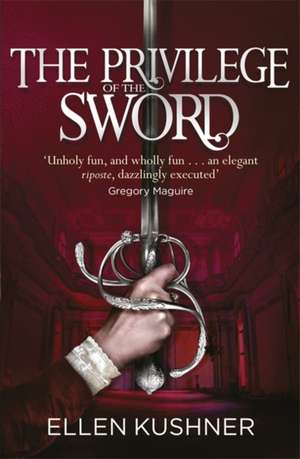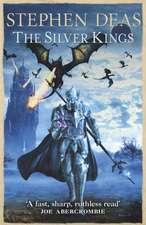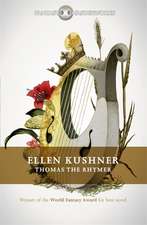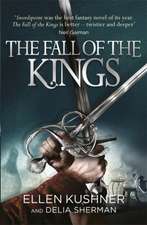The Privilege of the Sword
Autor Ellen Kushneren Limba Engleză Paperback – 12 oct 2016
| Toate formatele și edițiile | Preț | Express |
|---|---|---|
| Paperback (2) | 50.11 lei 3-5 săpt. | |
| Orion Publishing Group – 12 oct 2016 | 50.11 lei 3-5 săpt. | |
| Spectra Books – 30 iun 2006 | 138.01 lei 3-5 săpt. |
Preț: 50.11 lei
Nou
Puncte Express: 75
Preț estimativ în valută:
9.59€ • 10.04$ • 7.93£
9.59€ • 10.04$ • 7.93£
Carte disponibilă
Livrare economică 15-29 martie
Preluare comenzi: 021 569.72.76
Specificații
ISBN-13: 9781473214736
ISBN-10: 1473214734
Pagini: 384
Dimensiuni: 162 x 200 x 27 mm
Greutate: 0.31 kg
Editura: Orion Publishing Group
ISBN-10: 1473214734
Pagini: 384
Dimensiuni: 162 x 200 x 27 mm
Greutate: 0.31 kg
Editura: Orion Publishing Group
Notă biografică
Ellen Kushner is a novelist, performer, and public radio personality. Her work includes the weekly notational public radio series PRI’s Sound & Spirit with Ellen Kushner, the recording The Golden Dreydl: a Klezmer ‘Nutcracker’ for Chanukah (Ryykodisc CD) and a live performance piece, Esther: the feast of Masks. Her novels Swordpoint and (with Delia Sherman) The Fall of Kings share a setting and quite a few characters with The Privilege of The Swords. She is a member of Terri Windling’s Endicott Studio for Mythic Arts and co-founder of the Interstitial Arts Foundation. She lives in New York City and travels a lot, giving shows and readings, lecturing and teaching. You can keep up with her whereabouts and learn more about Riverside and its denizens at www.EllenKushner.com
Her novel Thomas the Rhymer won the World Fantasy Award.
Her novel Thomas the Rhymer won the World Fantasy Award.
Extras
Chapter I
No one sends for a niece they've never seen before just to annoy her family and ruin her life. That, at least, is what I thought. This was before I had ever been to the city. I had never been in a duel, or held a sword myself. I had never kissed anyone, or had anyone try to kill me, or worn a velvet cloak. I had certainly never met my uncle the Mad Duke. Once I met him, much was explained.
***
On the day we received my uncle's letter, I was in the pantry counting our stock of silverware. Laden with lists, I joined my mother in the sunny parlor over the gardens where she was hemming kerchiefs. We did these things ourselves these days. Outside, I could hear the crows cawing in the hills, and the sheep bleating over them. I wasn't looking at her; my eyes were on the papers before me, and I was worrying about the spoons, which needed polishing, but we might have to sell them, so why bother now?
"Three hundred and thirteen spoons," I said, consulting the lists. "We're short three spoons from last time, Mother."
She did not reply. I looked up. My mother was staring out the window and gnawing on one end of her silky hair. I wish I had hair like that; mine curls, in all the wrong ways. "Do you think," she said at last, "that we should have that tree taken down?"
"We're doing silver inventory," I said sternly, "and we're short."
"Are you sure you have the right list? When did we count them last?"
"Gregory's Coming-of-Age party, I think. My hands smelt of polish all through dinner. And he never even thanked me for it, the pig."
"Oh, Katherine."
My mother has a way of saying my name as though it were an entire speech. This one included When will you and How silly and I couldn't do without you all at once. But I wasn't in the mood to hear it. While it must be done and there is no sense shirking, counting silver is not my favorite chore, although it ranks above fine needlework and making jam.
"I bet no one likes Greg there in the city, either, unless he's learned to be nicer to people."
There was a sudden jerky movement as she set her sewing down. I waited to be chastised. The silence became frightening. I looked to see that her hands were clutching the work down in her lap, regardless of what that was doing to the linen. She was holding her head very high, which was a mistake, because the moment I looked I knew from the set of her mouth and the wideness of her eyes that she was trying not to cry. Softly I put down my papers and knelt at her side, nestling in her skirts where I felt safe. "I'm sorry, Mama," I said, stroking the fabric. "I didn't mean it."
My mother twisted her finger in a lock of my hair. "Katie . . ." She breathed a long sigh. "I've had a letter from my brother."
My breath caught. "Oh, no! Is it the lawsuit? Are we ruined?"
"Quite the contrary." But she didn't smile. The line that had appeared between her brows last year only got deeper. "No, it's an invitation. To Tremontaine House."
My uncle the Mad Duke had never invited us to visit him. It wouldn't be decent. Everyone knew how he lived. But that wasn't the point. The point was that almost since I was born, he had been out to ruin us. It was utterly ridiculous: when he had just inherited vast riches from their grandmother, the Duchess Tremontaine, along with the title, he started dickering over the bit of land my mother had gotten from their parents for her dowry--or rather, his lawyers did. The points were all so obscure that only the lawyers seemed to understand them, and no one my father hired could ever get the better of them. We didn't lose the land; we just kept having to sink more and more money into lawyers, while the land my uncle was contesting went into a trust that made it unavailable to us, along with its revenues, which made it even harder to pay the lawyers. . . .
I was quite small, but I remember how awful it always was when the letters came, heavy with their alarming seals. There would be an hour or two of perfect, dreadful stillness, and then everything would explode. My father would shout all sorts of things at my mother about her mad family, and why couldn't she control them all, he might as well have married the goosegirl for all the good she did him! And she would cry it wasn't her fault her brother was mad, and why didn't he ask her parents what was wrong with the contract instead of badgering her, and hadn't she done her duty by him? I heard quite a lot of this because when the shouting started she would clutch me to her, and when it was over she and I would often sneak off to the pantry and steal a pot of jam and eat it under the stairs. At the dinner table my father would quarrel with my older brothers about the cost of Greg's horses or Seb's tutors, or what they should plant in the south reach, or what to do about tenants poaching rabbits. I was glad I was too young for him to pay much attention to; only sometimes he would take my face in his big hands and look at me hard, as if he were trying to find out which side of the family I favored. "You're a sensible girl," he'd say hopefully. "You're a help to your mother, aren't you?" Well, I tried to be.
Father died suddenly when I was eleven. Things got much quieter then. And just as suddenly, the lawsuits stopped as well. It was as if the Mad Duke Tremontaine had forgotten all about us.
Then, about a year ago, just when we had begun to stop counting every copper, the letters started coming again, with their heavy seals. It seemed the lawsuit was back.
My brother Sebastian begged to be allowed to go to the city to study law at University, but Seb was needed at home; he was much too clever about land and farming and things. Instead Gregory, who was Lord Talbert now, went to the city to find us new lawyers, and take his place on the Council of Lords. It was expensive having him there, and we were once again without the revenue from my mother's portion. If we didn't sell the spoons, we were going to have to sell some of my father's land, and everyone knows once you start chipping away at your estate, you're pretty much done for.
And now here was the Mad Duke, actually inviting us to the city to be his guests at Tremontaine House. My mother looked troubled, but I knew such an invitation could mean only one thing: an end to the horrible lawsuits, the awful letters. Surely all was forgiven and forgotten. We would go to town and take our place amongst the nobility there at last, with parties and dancing and music and jewels and clothes--I threw my arms around my mother's waist, and hugged her warmly. "Oh, Mama! I knew no one could stay angry with you forever. I am so happy for you!"
But she pulled away from me. "Don't be. The entire thing is ridiculous. It's out of the question."
"But--don't you wish to see your brother again? If I hadn't seen Greg or Seb for twenty years, I'd at least be curious."
"I know what Davey's like." She twisted the handkerchief in her hand. "He hasn't changed a bit. He fought with our parents all the time . . . " She stroked my hair. "You don't know how lucky you are, Kitty, to have such a kind and loving family. I know Papa was sometimes harsh, but he did care for all of us. And you and I have always been the best of friends, haven't we?"
I nodded.
"Davey and I were like that. Friends. Good friends, together against the world. We made up games, and protected each other. But people grow up, don't they? You can't stay a child forever. When my parents chose a husband for me, we were--he was--well, Davey just didn't understand that things must change."
"He hated Papa, didn't he?"
"He was only a boy; what did he know? Charles was a neighbor, not some stranger. My parents trusted him and knew he'd take good care of me. Of course I shed a few tears; I was a young girl, afraid to leave my home for the first time. My brother, though--well, he simply could not understand that, in the end, one has a duty to one's family. He never did, and he never will."
She was going to ruin that cloth, but I didn't want to stop her flow of words. A lot had happened in our family that no one had ever explained to me.
"And now it's the same thing all over again! " she cried, ripping the hem without seeing it. "Just when we thought things were about to get better, he went and made them worse, much worse, to please himself and hurt the rest of us. Just the same as now."
She started stabbing at the kerchief with her needle. "How?" I breathed, hoping to still her hands, hoping to keep the words coming. "How is it the same?"
"The duchess," my mother said, her lips tight. She wasn't even seeing me, I could tell; her eyes were on an invisible past when everything had gone wrong before I was born. "Our grandmother, the noble Duchess Tremontaine. Who didn't even come to my wedding; she still wasn't speaking to our mother. But she invited my brother to the city, to stay with her at Tremontaine House. It was his big chance--our big chance--to reconcile with her, to make something of himself. And what did he do? He ran away."
"Where?"
"To University." She bit a thread in half. "Right there in the city, right under the duchess's very nose. Mother was beside herself. Gregory had just been born, and I had to leave him here all alone with your father and the servants to go and tend to her. You know what she was like." I nodded; Grandmother Campion had been terrifying. "Next we heard, he'd run away from University as well, gone to live in some city slum. We were sure he was dead. But he wasn't dead. He was bringing more shame on us by carrying on with a notorious swordsman. It all came out when the duchess found him. I suppose he amused her, because a few years later she died, naming him her heir! Mother wrote him a long letter, and sent him some things, but he never replied."
"Go and see him," I urged her poetically. "Who knows but that he may yet relent, and remember the days of his youth, when you were the best of friends?"
"Katherine Samantha." She looked away from the past, and directly at me. "You have not been listening to what I've been telling you. It's you he wishes to see."
"Me! But--but-- Why?"
She shook her head. "Oh, it's too ridiculous even to contemplate."
"Mother." I took both her hands in mine. "You cannot say that and expect me to go on counting silver as if nothing had happened. It is impossible. What does he want to see me about?"
"He says he wants to make a swordsman of you."
I laughed--well, I snorted, actually. If I'd had anything in my mouth, it would have flown across the room. That sort of laugh.
"Just so," she said. "You go live with him and study the sword, and in return he'll not only drop the lawsuits, he'll pay off all our debts, and--well, he's prepared to be very generous."
I began to see, or thought I did. "He wants me to come to the city. To Tremontaine House," I breathed. "To make our fortune."
She said, "Of course, the thing is impossible."
"But Mother," I said, "what about my duty to my family?"
chapter II
You have no use for girls. You told me so yourself."
In a fine room in the Mad Duke Tremontaine's house, a fat and messy young woman sprawled on a velvet chaise longue, one hand buried in a bowl of summer strawberries. Across the room, the Mad Duke examined the back of his chimneypiece for cracks. "Utter incompetents," he grumbled. "They wouldn't know wood-bore from a tick on their dog's ass."
She stuck to the subject. "Neither would girls."
"I do have no use for girls. Not that way; not with ones I'm related to, anyway." He popped out of the fireplace to leer briefly, but getting no response went back and continued, "You should be grateful. Or, as the only respectable female of my acquaintance, you are the one I would have to impose upon to escort my niece to dances and things when she gets here."
The homely woman, whose name was Flavia, but whom everyone thought of as That Ugly Girl of the Duke's, put a large berry in her mouth, wiped her fingers on the velvet of the chaise and talked around it. "Any titled lady whose husband owes you money would be delighted to take your niece in hand, if only to show you how it's done properly and try to instill some gratitude in you." She licked juice off her lips. "You know, I've been meaning to ask you: why do you talk so much, when half of what you say is utter crap?"
"To keep you on your toes," he answered promptly. "How would you like it if everything I said suddenly started making sense? It would only confuse you."
Unfolding his long body from the guts of the fireplace, the duke thrust his ruffled cuffs under his fat friend's nose for inspection. "Would you say these are dirty?"
"Dirty is not the word I would use." She stared at the lace. "That implies that somewhere under the carbon there exists white linen in its original state. But I think an alchemical transformation has been effected here."
"At last!" He lunged for the bellpull. "I shall have to document it." His fingers left black smudges on the embroidered fabric. "You will be amazed to learn that I, too, have read Fayerweather. You have, as usual, completely bollixed his concept of Original State: it has nothing to do with alchemy."
"Did I quote Fayerweather?"
"No. You eviscerated him, and threw his carcass to the geese."
The duke's summons was answered by a stocky boy. Everything about him was middling: his height, weight, color and curl of hair, skin, ears, even his deportment, caught as it was in the middle between a boy's awkwardness and a young man's strength. His arms were a little long, but that was all.
"Isn't he wonderful?" the duke asked fondly.
The Ugly Girl threw a strawberry at the boy, which he failed to catch; nor did he run after it to pick it up when it rolled into a corner. "Dear one," she said to the duke, "you could surround yourself with much prettier company than those present."
"I do," he replied. "But they have a tendency to think too highly of themselves. So I get rid of them.
Over and over and over and over," he sighed. "Marcus," he told the boy, "get me a clean shirt."
"Yes, my lord."
No one sends for a niece they've never seen before just to annoy her family and ruin her life. That, at least, is what I thought. This was before I had ever been to the city. I had never been in a duel, or held a sword myself. I had never kissed anyone, or had anyone try to kill me, or worn a velvet cloak. I had certainly never met my uncle the Mad Duke. Once I met him, much was explained.
***
On the day we received my uncle's letter, I was in the pantry counting our stock of silverware. Laden with lists, I joined my mother in the sunny parlor over the gardens where she was hemming kerchiefs. We did these things ourselves these days. Outside, I could hear the crows cawing in the hills, and the sheep bleating over them. I wasn't looking at her; my eyes were on the papers before me, and I was worrying about the spoons, which needed polishing, but we might have to sell them, so why bother now?
"Three hundred and thirteen spoons," I said, consulting the lists. "We're short three spoons from last time, Mother."
She did not reply. I looked up. My mother was staring out the window and gnawing on one end of her silky hair. I wish I had hair like that; mine curls, in all the wrong ways. "Do you think," she said at last, "that we should have that tree taken down?"
"We're doing silver inventory," I said sternly, "and we're short."
"Are you sure you have the right list? When did we count them last?"
"Gregory's Coming-of-Age party, I think. My hands smelt of polish all through dinner. And he never even thanked me for it, the pig."
"Oh, Katherine."
My mother has a way of saying my name as though it were an entire speech. This one included When will you and How silly and I couldn't do without you all at once. But I wasn't in the mood to hear it. While it must be done and there is no sense shirking, counting silver is not my favorite chore, although it ranks above fine needlework and making jam.
"I bet no one likes Greg there in the city, either, unless he's learned to be nicer to people."
There was a sudden jerky movement as she set her sewing down. I waited to be chastised. The silence became frightening. I looked to see that her hands were clutching the work down in her lap, regardless of what that was doing to the linen. She was holding her head very high, which was a mistake, because the moment I looked I knew from the set of her mouth and the wideness of her eyes that she was trying not to cry. Softly I put down my papers and knelt at her side, nestling in her skirts where I felt safe. "I'm sorry, Mama," I said, stroking the fabric. "I didn't mean it."
My mother twisted her finger in a lock of my hair. "Katie . . ." She breathed a long sigh. "I've had a letter from my brother."
My breath caught. "Oh, no! Is it the lawsuit? Are we ruined?"
"Quite the contrary." But she didn't smile. The line that had appeared between her brows last year only got deeper. "No, it's an invitation. To Tremontaine House."
My uncle the Mad Duke had never invited us to visit him. It wouldn't be decent. Everyone knew how he lived. But that wasn't the point. The point was that almost since I was born, he had been out to ruin us. It was utterly ridiculous: when he had just inherited vast riches from their grandmother, the Duchess Tremontaine, along with the title, he started dickering over the bit of land my mother had gotten from their parents for her dowry--or rather, his lawyers did. The points were all so obscure that only the lawyers seemed to understand them, and no one my father hired could ever get the better of them. We didn't lose the land; we just kept having to sink more and more money into lawyers, while the land my uncle was contesting went into a trust that made it unavailable to us, along with its revenues, which made it even harder to pay the lawyers. . . .
I was quite small, but I remember how awful it always was when the letters came, heavy with their alarming seals. There would be an hour or two of perfect, dreadful stillness, and then everything would explode. My father would shout all sorts of things at my mother about her mad family, and why couldn't she control them all, he might as well have married the goosegirl for all the good she did him! And she would cry it wasn't her fault her brother was mad, and why didn't he ask her parents what was wrong with the contract instead of badgering her, and hadn't she done her duty by him? I heard quite a lot of this because when the shouting started she would clutch me to her, and when it was over she and I would often sneak off to the pantry and steal a pot of jam and eat it under the stairs. At the dinner table my father would quarrel with my older brothers about the cost of Greg's horses or Seb's tutors, or what they should plant in the south reach, or what to do about tenants poaching rabbits. I was glad I was too young for him to pay much attention to; only sometimes he would take my face in his big hands and look at me hard, as if he were trying to find out which side of the family I favored. "You're a sensible girl," he'd say hopefully. "You're a help to your mother, aren't you?" Well, I tried to be.
Father died suddenly when I was eleven. Things got much quieter then. And just as suddenly, the lawsuits stopped as well. It was as if the Mad Duke Tremontaine had forgotten all about us.
Then, about a year ago, just when we had begun to stop counting every copper, the letters started coming again, with their heavy seals. It seemed the lawsuit was back.
My brother Sebastian begged to be allowed to go to the city to study law at University, but Seb was needed at home; he was much too clever about land and farming and things. Instead Gregory, who was Lord Talbert now, went to the city to find us new lawyers, and take his place on the Council of Lords. It was expensive having him there, and we were once again without the revenue from my mother's portion. If we didn't sell the spoons, we were going to have to sell some of my father's land, and everyone knows once you start chipping away at your estate, you're pretty much done for.
And now here was the Mad Duke, actually inviting us to the city to be his guests at Tremontaine House. My mother looked troubled, but I knew such an invitation could mean only one thing: an end to the horrible lawsuits, the awful letters. Surely all was forgiven and forgotten. We would go to town and take our place amongst the nobility there at last, with parties and dancing and music and jewels and clothes--I threw my arms around my mother's waist, and hugged her warmly. "Oh, Mama! I knew no one could stay angry with you forever. I am so happy for you!"
But she pulled away from me. "Don't be. The entire thing is ridiculous. It's out of the question."
"But--don't you wish to see your brother again? If I hadn't seen Greg or Seb for twenty years, I'd at least be curious."
"I know what Davey's like." She twisted the handkerchief in her hand. "He hasn't changed a bit. He fought with our parents all the time . . . " She stroked my hair. "You don't know how lucky you are, Kitty, to have such a kind and loving family. I know Papa was sometimes harsh, but he did care for all of us. And you and I have always been the best of friends, haven't we?"
I nodded.
"Davey and I were like that. Friends. Good friends, together against the world. We made up games, and protected each other. But people grow up, don't they? You can't stay a child forever. When my parents chose a husband for me, we were--he was--well, Davey just didn't understand that things must change."
"He hated Papa, didn't he?"
"He was only a boy; what did he know? Charles was a neighbor, not some stranger. My parents trusted him and knew he'd take good care of me. Of course I shed a few tears; I was a young girl, afraid to leave my home for the first time. My brother, though--well, he simply could not understand that, in the end, one has a duty to one's family. He never did, and he never will."
She was going to ruin that cloth, but I didn't want to stop her flow of words. A lot had happened in our family that no one had ever explained to me.
"And now it's the same thing all over again! " she cried, ripping the hem without seeing it. "Just when we thought things were about to get better, he went and made them worse, much worse, to please himself and hurt the rest of us. Just the same as now."
She started stabbing at the kerchief with her needle. "How?" I breathed, hoping to still her hands, hoping to keep the words coming. "How is it the same?"
"The duchess," my mother said, her lips tight. She wasn't even seeing me, I could tell; her eyes were on an invisible past when everything had gone wrong before I was born. "Our grandmother, the noble Duchess Tremontaine. Who didn't even come to my wedding; she still wasn't speaking to our mother. But she invited my brother to the city, to stay with her at Tremontaine House. It was his big chance--our big chance--to reconcile with her, to make something of himself. And what did he do? He ran away."
"Where?"
"To University." She bit a thread in half. "Right there in the city, right under the duchess's very nose. Mother was beside herself. Gregory had just been born, and I had to leave him here all alone with your father and the servants to go and tend to her. You know what she was like." I nodded; Grandmother Campion had been terrifying. "Next we heard, he'd run away from University as well, gone to live in some city slum. We were sure he was dead. But he wasn't dead. He was bringing more shame on us by carrying on with a notorious swordsman. It all came out when the duchess found him. I suppose he amused her, because a few years later she died, naming him her heir! Mother wrote him a long letter, and sent him some things, but he never replied."
"Go and see him," I urged her poetically. "Who knows but that he may yet relent, and remember the days of his youth, when you were the best of friends?"
"Katherine Samantha." She looked away from the past, and directly at me. "You have not been listening to what I've been telling you. It's you he wishes to see."
"Me! But--but-- Why?"
She shook her head. "Oh, it's too ridiculous even to contemplate."
"Mother." I took both her hands in mine. "You cannot say that and expect me to go on counting silver as if nothing had happened. It is impossible. What does he want to see me about?"
"He says he wants to make a swordsman of you."
I laughed--well, I snorted, actually. If I'd had anything in my mouth, it would have flown across the room. That sort of laugh.
"Just so," she said. "You go live with him and study the sword, and in return he'll not only drop the lawsuits, he'll pay off all our debts, and--well, he's prepared to be very generous."
I began to see, or thought I did. "He wants me to come to the city. To Tremontaine House," I breathed. "To make our fortune."
She said, "Of course, the thing is impossible."
"But Mother," I said, "what about my duty to my family?"
chapter II
You have no use for girls. You told me so yourself."
In a fine room in the Mad Duke Tremontaine's house, a fat and messy young woman sprawled on a velvet chaise longue, one hand buried in a bowl of summer strawberries. Across the room, the Mad Duke examined the back of his chimneypiece for cracks. "Utter incompetents," he grumbled. "They wouldn't know wood-bore from a tick on their dog's ass."
She stuck to the subject. "Neither would girls."
"I do have no use for girls. Not that way; not with ones I'm related to, anyway." He popped out of the fireplace to leer briefly, but getting no response went back and continued, "You should be grateful. Or, as the only respectable female of my acquaintance, you are the one I would have to impose upon to escort my niece to dances and things when she gets here."
The homely woman, whose name was Flavia, but whom everyone thought of as That Ugly Girl of the Duke's, put a large berry in her mouth, wiped her fingers on the velvet of the chaise and talked around it. "Any titled lady whose husband owes you money would be delighted to take your niece in hand, if only to show you how it's done properly and try to instill some gratitude in you." She licked juice off her lips. "You know, I've been meaning to ask you: why do you talk so much, when half of what you say is utter crap?"
"To keep you on your toes," he answered promptly. "How would you like it if everything I said suddenly started making sense? It would only confuse you."
Unfolding his long body from the guts of the fireplace, the duke thrust his ruffled cuffs under his fat friend's nose for inspection. "Would you say these are dirty?"
"Dirty is not the word I would use." She stared at the lace. "That implies that somewhere under the carbon there exists white linen in its original state. But I think an alchemical transformation has been effected here."
"At last!" He lunged for the bellpull. "I shall have to document it." His fingers left black smudges on the embroidered fabric. "You will be amazed to learn that I, too, have read Fayerweather. You have, as usual, completely bollixed his concept of Original State: it has nothing to do with alchemy."
"Did I quote Fayerweather?"
"No. You eviscerated him, and threw his carcass to the geese."
The duke's summons was answered by a stocky boy. Everything about him was middling: his height, weight, color and curl of hair, skin, ears, even his deportment, caught as it was in the middle between a boy's awkwardness and a young man's strength. His arms were a little long, but that was all.
"Isn't he wonderful?" the duke asked fondly.
The Ugly Girl threw a strawberry at the boy, which he failed to catch; nor did he run after it to pick it up when it rolled into a corner. "Dear one," she said to the duke, "you could surround yourself with much prettier company than those present."
"I do," he replied. "But they have a tendency to think too highly of themselves. So I get rid of them.
Over and over and over and over," he sighed. "Marcus," he told the boy, "get me a clean shirt."
"Yes, my lord."
Recenzii
"It's beautifully written, breezy, quick, hysterically funny, poignant and bloody and world-weary and heartrendingly naive by turns. This is a fantastic book, a coming-of-age story, and I love it with a quite deep and unreasonable love".—Elizabeth Bear, author of Worldwired
"Winning high fantasy ... a welcome return to the romantic Riverside world Kushner introduced in Swordspoint."—Publishers Weekly
"One of the most gorgeous books I've ever read: it's witty and wonderful, with characters that will provoke, charm and delight."—Holly Black, author of Tithe and Valiant
"A magical mixture of Dumas and Georgette Heyer. The dialogue dazzles and so does the swordplay."—Kelly Link, author of Magic For Beginners
"A swashbuckler for women—splendid!"—Tamora Pierce
“Unholy fun, and wholly fun...an elegant riposte, dazzlingly executed.” – Gregory Maguire, NYT bestselling author of Wicked
"Winning high fantasy ... a welcome return to the romantic Riverside world Kushner introduced in Swordspoint."—Publishers Weekly
"One of the most gorgeous books I've ever read: it's witty and wonderful, with characters that will provoke, charm and delight."—Holly Black, author of Tithe and Valiant
"A magical mixture of Dumas and Georgette Heyer. The dialogue dazzles and so does the swordplay."—Kelly Link, author of Magic For Beginners
"A swashbuckler for women—splendid!"—Tamora Pierce
“Unholy fun, and wholly fun...an elegant riposte, dazzlingly executed.” – Gregory Maguire, NYT bestselling author of Wicked









